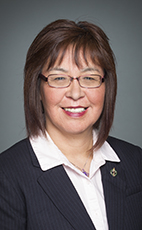Mr. Speaker,
[Member spoke in Dene]
[English]
Today is a big day for indigenous languages in the House of Commons. I am going to be splitting my comments in half today. First I will be speaking in English for the benefit of my colleagues, and afterward I will be making comments in my first language, Dene, which I will soon be able to speak more freely in this chambers.
I am very happy with the findings of the procedure and House affairs committee report on the use of Indigenous languages in the House. I would like to give a special thanks to the members of the procedure and House affairs committee for their hard work and commitment. Adopting Indigenous languages into House business is no easy task, but because of the members, we are now one step closer to equal recognition.
[Member spoke in Dene]
[English]
As I have said many times, I am a Dene woman, and I grew up on a trap line in northern Saskatchewan. The large majority of people in my riding are Dene or Cree, first nation and Métis, and many people speak more than one language. The diversity of languages across the riding is awesome, yet challenging.
I recently had the privilege of attending the First Nations' Language Keepers Conference in Saskatoon, hosted by the Saskatchewan Indigenous Cultural Centre.
At the conference, I heard from educators like Julia Oullette, who teaches Cree to youth, using physical actions to get the kids moving around while they are learning. I heard from entertainers like Brian Waskewitch, who uses puppets to engage with small kids in Plains Cree, using language they will understand.
I also heard from the youth directly. Davis Horse from Thunderchild First Nation lives in a Cree-only household and encourages a traditional lifestyle for youth across Saskatchewan. I also met with Cameron Lozinski who is developing a smart phone app with his elders to help more young people access his language.
If I have one takeaway from my experience at this conference, it is that we must provide leadership and act as role models for young indigenous youth who want to speak their languages. First nations, Métis and Inuit languages are thriving across Canada, contrary to popular belief.
I am glad to see that the committee's report agrees that the House should build our capacity to speak our languages. Communicating with our constituents in the languages they speak is so important. Adopting this report may seem small, but it will have a significant impact in our communities, in our schools and in our homes.
We will be better able to speak about the issues that matter to them, like education, access to health care and northern infrastructure. An informed democracy is a strong democracy and adopting this report is a step in the right direction.
At this time, I am switching to my first language.
[Member spoke in Dene]
[English]
I just delivered a similar presentation in Dene.
At this time, for all Canadians from coast to coast to coast, we have this opportunity to acknowledge the indigenous languages across Canada, in the place of the federal government and in the House of Commons. We are able to speak in our languages and showcase our first language, which in my case is Dene. In my riding, I have Cree, three dialects, the Métis, the Michif, and other indigenous languages. It is a very significant step in the right direction. We are building bridges and reconciliation is beginning to occur.
Therefore, from the bottom of my heart, I want to thank all my friends on the committee, all members of Parliament and the government officials who helped make this happen.
You, too, Mr. Speaker, helped make it happen, so thank you from the bottom of my heart.
[Member spoke in Dene]
[English]

